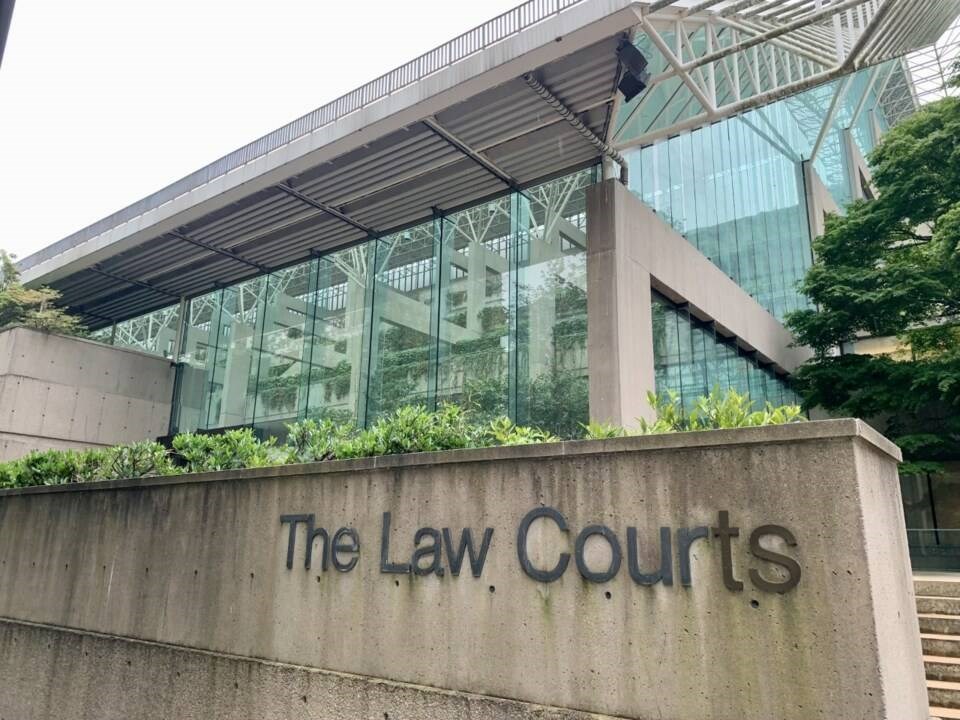Striking workers at a Vancouver airport in Richmond “skated perilously close” to the line of breaching a court order about noise levels.
However, the owner of the Sheraton Vancouver Airport Hotel on Westminster Highway failed to prove “that they actually crossed it,” according to a recent B.C. Supreme Court judgment.
Justice William Milman ruled the Sheraton couldn’t prove noisemakers, including handclappers and drums, were emitting noise above 75 decibels after the union was ordered to keep any noise on their picket lines below this.
The unionized hotel workers have been on strike since June 14, picketing the hotel and two adjacent hotels, the Vancouver Airport Marriott and Hilton Vancouver, which are owned by the same company.
The picketers, who belong to Unite Here Local 40, can be seen regularly on Westminster Highway and walking around the hotel complex block.
The Sheraton sought an interim injunction early in the summer to reduce the amount of noise on the picket lines.
On Aug. 2, a judge prohibited strikers from using air horns, blow horns and whistles near the hotel. Furthermore, they were ordered not to use drums, microphones, speakers, megaphones and other electronic devices to amplify sound above 75 decibels.
The noise level, however, needed to be measured by a City of Richmond approved device and at a distance of 6.1 metres.
The hotel claimed picketers were breaching this court injunction.
Not only did the hotel ask the court to hold the union members in contempt of court, they wanted the order enforced by the police.
The hotel provided evidence – collected by security guards – showing the picketers using drums, whistling, using hand-clappers and megaphones.
But the judge questioned the evidence, noting, for example, recordings don’t show the decibel reading was generated by a specific drum recorded on a video.
Another video shows levels at 75 decibels, but this is less than 6.1 metres away.
Even evidence from an acoustical consultant hired by the hotel was dismissed by the judge because it didn’t identify the location where noise levels above 75 decibels were recorded.
The union, on the other hand, used an expert from a previous strike who noted that drums could be spaced apart and not hit too hard and hand-clappers could be used all the while keeping the noise under 75 decibels.
The vice-president of the union, Gulzar Grewal, said the security guards were never farther than two metres away when they recorded the noise made by the striking workers.
Grewal said a drum was used with a plastic ladle to reduce the noise, but it is no longer being used.
The judge concluded that noise above 75 decibels was largely due to the picketers’ voices or handclappers, which aren’t percussion instruments.
The judge concluded hand-clappers used were not drums, and, rather than using a whistle as an instrument, whistling was done by the picketers’ mouths and lips.
The judge did conclude the picketers used a drum, a megaphone and a speaker after the injunction was imposed, but these didn’t go over 75 decibels.
Furthermore, the judge concluded the picketers did generate noise above 75 decibels, but that was using their voices and handclappers.
But because the judge felt the union had come close to breaching the order, he ordered both parties to pay their own cost, adding, according to the union’s own expert, the picketers used a drum at 75 decibels, which is “just shy of a breach.” And using a megaphone was also “of concern,” the judge said.
“It is clear at the very least that the Respondents have at times skated perilously close to the line, notwithstanding that the plaintiffs have failed to prove, to the requisite standard, that they actually crossed it,” wrote Justice William Milman in his judgment.



